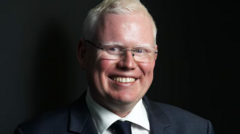In a significant legal development, Conor McGregor has been found liable for civil damages following accusations of rape made by Nikita Hand. The High Court jury concluded that McGregor assaulted Hand in December 2018 at a Dublin hotel, leading to a compensation order exceeding €248,000. Hand, who expressed her emotional relief after the verdict, emphasized the power of speaking out against abuse. McGregor, for his part, has declared his intention to appeal, maintaining his innocence and stating he is redirecting focus towards his family and future endeavors.
Conor McGregor Found Liable in Civil Rape Case, Ordered to Pay Damages

Conor McGregor Found Liable in Civil Rape Case, Ordered to Pay Damages
A jury in Dublin has ruled against the Irish MMA star in a civil case regarding allegations of sexual assault.
Ms. Hand celebrated a pivotal victory when the jury delivered its verdict after intensive deliberation, highlighting the importance of courage in facing powerful figures. The case, which also involved a separate allegation against James Lawrence—who was found not liable for assault—revealed harrowing details of emotional and physical trauma endured by Hand. Throughout the detailed proceedings, she portrayed the lasting impacts that the incident has had on her mental health and personal life, advocating for those who have experienced similar circumstances to seek justice without fear.
The jury’s decision serves as a reminder of the potential repercussions of celebrity and the legal system's role in addressing such serious claims of misconduct. Both McGregor and Lawrence had steadfastly denied the allegations, but the outcome of this civil case marks a critical moment not only for the individuals involved but for broader societal conversations on accountability and trauma recovery.
The jury’s decision serves as a reminder of the potential repercussions of celebrity and the legal system's role in addressing such serious claims of misconduct. Both McGregor and Lawrence had steadfastly denied the allegations, but the outcome of this civil case marks a critical moment not only for the individuals involved but for broader societal conversations on accountability and trauma recovery.




















